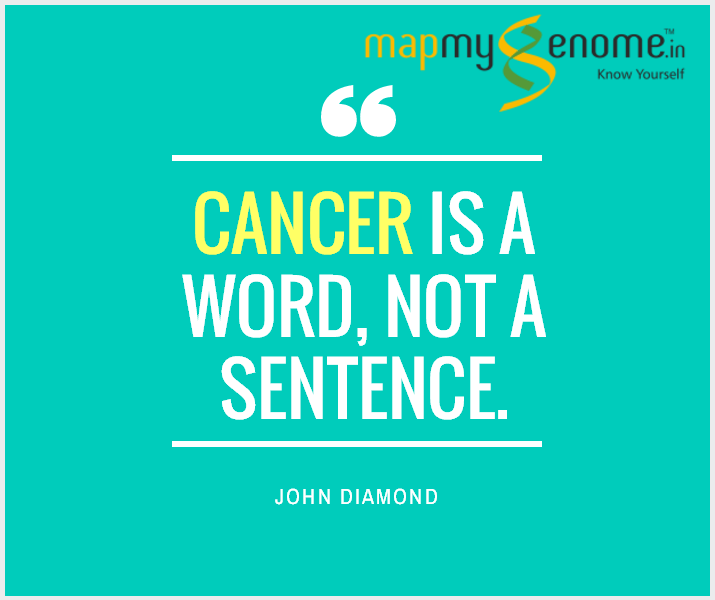Beyond BRCA and the Angelina Jolie Effect
Feb 01, 2018
5582 Views
On May 14, 2013, Angelina Jolie wrote a piece in the New York Times titled ‘My Medical Choice’ describing her experience of learning about the change in the BRCA1 gene that made her more susceptible to develop breast and ovarian cancers and her decision to undergo risk-reducing surgeries. This brought attention to the BRCA gene, and along with it, a large pool of women worried about inheriting the BRCA gene. In the field of cancer genetics, we fondly call this the Angelina Jolie effect!
Breast Cancer susceptibility gene 1 and Breast Cancer susceptibility gene 2 a.k.a. BRCA1 and BRCA2 are the two genes most commonly associated with hereditary breast and ovarian cancers. Typically, about 1 in 400 people may have a disease-causing change (mutation) in one of these genes that predisposes them to an increased risk for primarily breast and ovarian cancers. In families with a BRCA1 or BRCA2, we may typically see a young age of onset of breast cancer usually under age 45, ovarian cancer, or males with breast cancer.
The lifetime risk (defined as the cumulative risk of cancer up to age 75-80 years) of developing breast cancer in women with a BRCA1 or BRCA2 gene mutations can be up to 60-80% and lifetime risk of developing ovarian cancer can be up to 20-45%. This risk will differ based on age, gene, and type of mutation. In addition, there is a small increased risk for pancreatic cancer, prostate cancer, and melanoma.
The new players in the field of cancer genetics
Hereditary breast and ovarian cancers are also associated with other cancer syndromes such as Li-Fraumeni (causative gene TP53), Cowden syndrome (causative gene PTEN), Peutz-Jeghers (causative gene SKT11) and Lynch syndrome (causative gene MLH1, MSH2, MSH6, PMS2 or EPCAM). Recently, due to advancement in genetics research, we have been able to identify more genes associated with hereditary cancer syndromes. Genes can be broadly categorized in three ways:
- High-risk genes: Genes like PALB2, PTEN, TP53, CDH1, or STK11 are high-risk genes. The lifetime risk of developing breast cancer is over 50%. Previous research has helped us establish risk estimates and a consensus on management based on international guidelines.
- Moderate-risk genes: Some genes that fall into this category are ATM or CHEK2. The lifetime risk associated with these is up to 30-40%. Since data for these genes are new and management guidelines are not well established, there may be more uncertainty associated with the information on moderate risk genes.
- Newly identified genes (considered low risk): Our current data on these genes is limited. We have some data to predict the types of tumor and but exact lifetime cancer risk estimates for these genes remain unclear. Due to the current limitations of data, there may be more uncertainty associated with the information on these genes.
Think beyond breast cancers…
BRCA1 and BRCA2 sometimes known as the ‘breast cancer genes’. However, they are also most commonly associated with hereditary ovarian cancers. Moreover, we see an increased risk for pancreatic cancers, prostate cancers, and melanoma. Similarly, other genes associated with hereditary forms of breast cancer may also increase the risk for other cancer types. For example, in Cowden syndrome, the PTEN gene causes an increased risk for breast, colon, and thyroid cancers. In addition, it is associated with various non-cancerous findings. When families are identified to have a mutation in one of these genes, management recommendations will include surveillance for all cancers types associated with that gene.
Yes, males can have (breast) cancers too!
A common misconception is that BRCA is a “breast cancer gene” and thus males are not affected by it. Both males and females are equally at risk of inheriting changes in BRCA genes from a parent. This is true for other genes associated with hereditary cancer syndromes. If a parent has a mutation in one of these genes, their children will have a 50% chance of inheriting the same mutation and a 50% chance of inheriting the copy of the gene without the mutation.
Both genders may have an increased risk of developing cancers associated with that gene. In fact, males who inherit mutations in BRCA1 or BRCA2 have an increased lifetime risk of developing breast cancers, up to 5-10% compared against less than 1% population risk.
Males with mutations in other hereditary cancer predisposition genes such as PTEN, CDH1, ATM, or CHEK2 have an increased risk of developing associated cancers like colon, thyroid, stomach, or pancreatic cancers; similar to females with the same mutations. It is strongly recommended that males with a personal or family history of cancers suspicious for hereditary cancer syndromes should seek genetic counseling.
Watch out for these red flags
Some of the common red flags that may make us suspicious for hereditary cancer syndromes:
- Early onset cancers, under age 50 years
- Personal or family history of ovarian cancer
- Personal or family history of males with breast cancer
- Multiple cancers diagnoses or bilateral cancers diagnoses (bilateral breast cancers or uterine and colon cancer for the same individual)
- Different types of cancers in the family (e.g., breast, ovarian, prostate)
- Rare types of cancers (adrenal cortical cancer, hemangioblastoma, retinoblastoma)
- Multiple generations affected with cancers (two or more generations with early onset or multiple people with cancer)

Genetic testing: A Pandora’s box or a useful tool to be proactive?
Genetic testing can be intimidating and complex. A common question that most people struggle with is ‘How can genetic testing help?’ Genetic testing may be able to identify underlying genetic causes of cancer in a family. Identifying a genetic mutation that predisposes individuals to an increased risk for cancer can be informative and in some cases lifesaving.
Some of the benefits of genetic testing are:
- Ability to predict the risk of cancers and types of cancers more accurately
- To personalize screening and management recommendations
- Help to make decisions about ongoing treatments
- To provide information to other family members
There are limitations to the information that can be obtained from genetic testing.
- A positive genetic test result cannot help us predict when and if the cancers will occur.
- For a few of us, learning about predisposition of cancer may increase anxiety.
- Genetic testing can lead to unexpected or unanticipated results. When testing the newly discovered genes, testing can sometimes leave us with more questions than answers.
- Cancer risk for some of the genes may be unclear. The data on types of cancer and risk of cancer is limited for some genes, making it difficult to have consensus on recommendations for management.
We all may feel differently about uncertain or unexpected information. While some of us may be more comfortable with uncertain or unexpected information; others may feel strongly about not opening the Pandora’s box!
But I don’t want genetic testing…
We understand that choosing to learn about your genetic makeup is a very personal choice. Even if you choose not to have genetic testing, you can take steps to reduce your risk of developing cancer. You may benefit from speaking with a genetic counselor who can help you identify some personalized management strategies based on your personal and family history. In addition, some lifestyle changes (regular exercise, a balanced healthy diet, reducing alcohol and smoking cessation) can reduce your risk for cancer.

You are not alone!
Being diagnosed with cancer can be isolating and frightening. It may seem like a long arduous road requiring multiple tests, appointments, decisions that may need to be taken; you are not alone in this journey. Many of us may have a strong family history of cancer, which can cause anxiety and fear of an impending diagnosis. Reach out to other cancer support groups, talk to your friends and family members and most importantly, reach out to your healthcare team with any questions – we are here to support you!
Speaking with a genetic counselor can help you to better understand the diagnosis and discuss emotional and medical implications for yourself and your family members. A genetic counselor is a specialized health care professional who has expertise in medical genetics and psychological counseling.
So, what is the take-home message?
- BRCA1 and BRCA2 are not the only genes associated with hereditary forms of breast and ovarian cancers. There are other genes associated with hereditary cancers. If you have already tested for BRCA1 or BRCA2 and tested negative, the cancers in your family may be due to other cancer predisposition genes. Consult a genetic counselor to discuss further testing based on personal and family history.
- If you have a personal or family history of cancer that may be suspicious for hereditary cancer predisposition syndromes, seek a genetic counselor who can assess your personal and family history and recommend the best next steps for genetic testing or medical management.
- Both men and women can be at risk for inheriting genetic mutations from their parent, which may increase their risk of developing cancer.
If you would like to set up a genetic counseling appointment as you have a personal or family history suspicious of hereditary cancer syndrome CALL US on 1800 102 4595 (toll-free) or 040-66986700 or WRITE TO US at info@mapmygenome.in
References
- ASCO guidelines for genetic testing: https://www.asco.org/practice-guidelines/cancer-care-initiatives/genetics-toolkit/genetic-testing
- NCCN guidelines for genetic testing for hereditary breast and ovarian cancer syndromes
- NCCN guidelines for genetic testing for hereditary colorectal cancers

